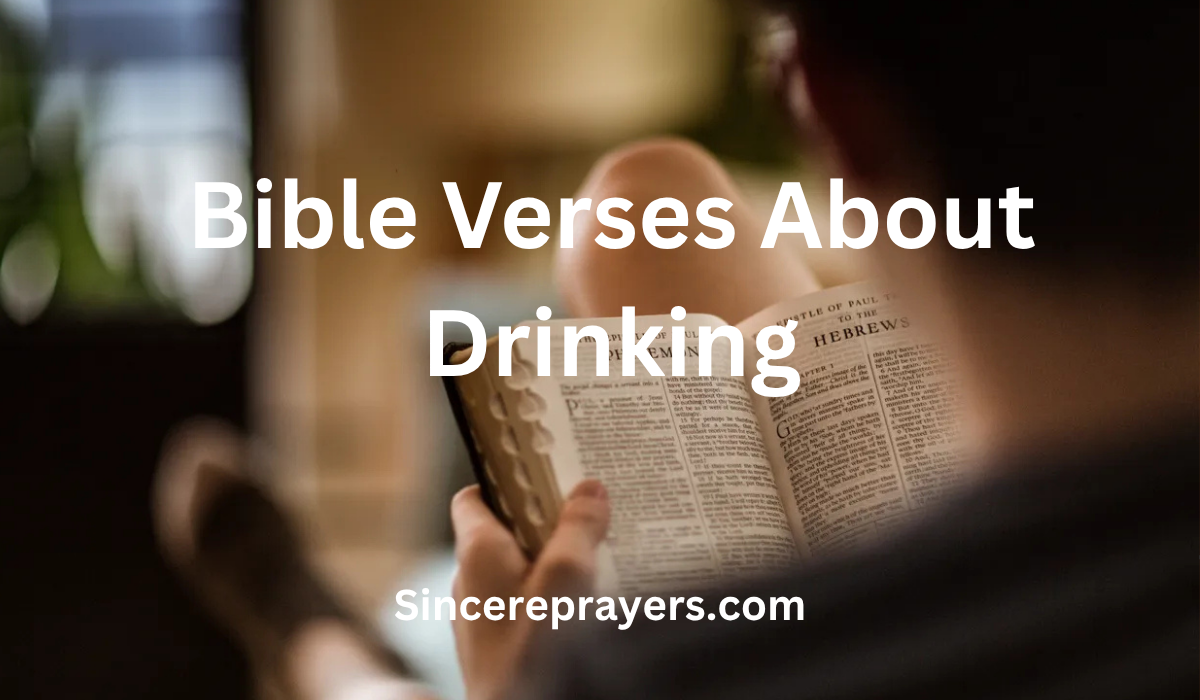The Bible verses about drinking speaks with wisdom and balance about drinking neither condoning drunkenness nor condemning the moderate use of wine in itself. From Genesis to Revelation, Scripture addresses how alcohol can influence one’s character, decision-making, and relationship with God. Understanding these verses helps believers approach drinking with discernment, moderation, and reverence for their witness before others.
Throughout history, wine was a common part of meals and celebrations, even used in sacred ceremonies. Jesus Himself turned water into wine at Cana, symbolizing joy and divine blessing. Yet the same Bible that acknowledges its use also warns against the dangers of excess. Drunkenness clouds judgment, opens doors to sin, and distances us from godly living. The key lies not in the drink itself, but in how we approach it with wisdom and self-control.

Believers are called to live sober-minded lives, filled with the Spirit rather than with indulgence. The Apostle Paul contrasts drunkenness with spiritual fullness, urging followers of Christ to let the Holy Spirit govern their desires. In doing so, Christians reflect integrity, self-discipline, and holiness in a world prone to excess. These teachings reveal that moderation is not simply about avoiding sin but about honoring God with every choice.
This collection of 35 powerful Bible verses about drinking offers insight into how God’s Word views alcohol. Each verse provides perspective warning against misuse, highlighting wisdom, and guiding believers toward a life of temperance and spiritual clarity. As you meditate on these Scriptures, may they inspire you to live in sobriety of mind and purity of heart, finding joy not in earthly intoxication but in the fullness of God’s Spirit.
35 Powerful Bible Verses About Drinking in 2025
1. Proverbs 20:1
“Wine is a mocker and beer a brawler; whoever is led astray by them is not wise.”
This verse personifies alcohol as a deceiver and troublemaker, cautioning believers against losing control. When drinking leads to mockery or aggression, wisdom departs. God’s Word calls us to discernment and restraint, showing that alcohol’s influence can corrupt judgment and relationships. Wisdom lies in mastering desires rather than being mastered by them, ensuring our actions glorify God rather than feed folly.
2. Ephesians 5:18
“Do not get drunk on wine, which leads to debauchery. Instead, be filled with the Spirit.”
Paul contrasts two forms of filling—one with wine, the other with the Holy Spirit. Drunkenness dulls spiritual sensitivity, while Spirit-filling produces clarity, joy, and holiness. This verse teaches believers that fulfillment should come from God’s presence, not substances. It reminds us that being guided by the Spirit leads to self-control and righteousness rather than reckless behavior or regret.
3. Proverbs 23:20–21
“Do not join those who drink too much wine or gorge themselves on meat, for drunkards and gluttons become poor, and drowsiness clothes them in rags.”
Excessive indulgence, whether in drink or food, leads to moral and material ruin. The passage warns that lack of discipline results in spiritual and financial decay. God’s wisdom calls us to moderation in all things, emphasizing that a life of restraint brings stability, prosperity, and favor. By avoiding the company of the indulgent, we guard our hearts and maintain spiritual focus.
4. Isaiah 5:11
“Woe to those who rise early in the morning to run after their drinks, who stay up late till they are inflamed with wine.”
This warning reveals how obsession with alcohol leads to spiritual blindness and neglect of God. When drinking dominates life’s rhythm, it replaces devotion with desire. God’s “woe” declares sorrow upon those enslaved by constant pursuit of pleasure. The verse urges believers to seek satisfaction in Him rather than temporary intoxication that dulls purpose and drains holiness.
5. 1 Corinthians 6:10
“Nor thieves nor the greedy nor drunkards nor slanderers nor swindlers will inherit the kingdom of God.”
Drunkenness is listed among sins that exclude one from God’s kingdom. This verse highlights how chronic indulgence reflects rebellion rather than repentance. While God’s grace forgives, true faith transforms desires. Believers are reminded that habitual drunkenness conflicts with righteousness and purity. Choosing sobriety demonstrates surrender to Christ’s lordship and the Spirit’s renewing power.
6. Galatians 5:19–21
“The acts of the flesh are obvious: sexual immorality, impurity and debauchery… drunkenness, orgies, and the like.”
Paul identifies drunkenness as a work of the flesh, incompatible with life in the Spirit. It dulls conscience and invites immorality. Those who continually yield to the flesh lose sight of God’s holiness. Believers are therefore called to crucify the old nature and live by the Spirit’s strength. Sobriety becomes an act of worship, aligning our hearts with God’s righteousness.
7. 1 Peter 4:3
“For you have spent enough time in the past doing what pagans choose to do—living in debauchery, lust, drunkenness, orgies, carousing and detestable idolatry.”
Peter reminds Christians that their past indulgences no longer define them. Life in Christ demands a break from destructive habits, including drunkenness. This verse encourages believers to embrace their new identity—one marked by holiness and self-control. By rejecting worldly excess, we testify to the transforming grace of God and the joy of living soberly before Him.
8. Romans 13:13
“Let us behave decently, as in the daytime, not in carousing and drunkenness, not in sexual immorality and debauchery, not in dissension and jealousy.”
Paul likens righteous living to walking in the light. Drunkenness belongs to the darkness of sin, where secrecy and shame thrive. Believers are urged to live transparently, with actions that reflect Christ’s purity. The verse calls us to moral alertness, showing that sobriety safeguards dignity and promotes peace. True decency shines when we walk free from worldly indulgence.
9. Habakkuk 2:15
“Woe to him who gives drink to his neighbors, pouring it from the wineskin till they are drunk, so that he can gaze on their naked bodies.”
This verse condemns those who use alcohol to exploit others. Drunkenness becomes not only personal sin but a tool for manipulation and shame. God’s judgment is pronounced on anyone who tempts or harms another through intoxication. It underscores accountability and compassion, urging believers never to cause another to stumble through reckless actions or peer pressure.
10. Leviticus 10:9
“You and your sons are not to drink wine or other fermented drink whenever you go into the tent of meeting, or you will die.”
God’s command to the priests highlights the seriousness of serving with a clear mind. Alcohol impairs discernment, making one unfit for holy service. This verse reminds believers that spiritual duties require mental alertness and purity. Whether in worship or daily living, we honor God through clarity of thought and reverence, ensuring nothing dulls our devotion or spiritual responsibility.
11. Titus 2:11–12
“For the grace of God has appeared that offers salvation to all people. It teaches us to say ‘No’ to ungodliness and worldly passions, and to live self-controlled, upright and godly lives in this present age.”
God’s grace not only forgives but transforms. Through His Spirit, we gain the power to deny harmful habits like drunkenness. This verse emphasizes that grace trains us in self-control and godliness. Living soberly becomes an act of gratitude for salvation—a visible sign of renewal. By resisting worldly passions, believers reflect the transforming work of God’s grace in daily living.
12. 1 Thessalonians 5:6–8
“So then, let us not be like others, who are asleep, but let us be awake and sober… putting on faith and love as a breastplate, and the hope of salvation as a helmet.”
Paul urges believers to remain spiritually alert and sober-minded. Sobriety here symbolizes vigilance against sin and spiritual slumber. Just as soldiers must stay awake in battle, Christians must guard their hearts through faith, love, and hope. Being sober allows believers to discern God’s will clearly and avoid the snares of temptation that thrive in carelessness or indulgence.
13. 1 Timothy 3:2–3
“Now the overseer is to be above reproach… not given to drunkenness, not violent but gentle, not quarrelsome, not a lover of money.”
Leaders in the church are called to model discipline and purity. Drunkenness compromises integrity and weakens testimony. Paul instructs that those guiding others must live temperately, showing that spiritual authority flows from moral consistency. This standard applies to all believers, reminding us that leadership begins with self-control and humility before God, not indulgence in worldly excess.
14. 1 Timothy 5:23
“Stop drinking only water, and use a little wine because of your stomach and your frequent illnesses.”
Paul’s instruction to Timothy shows balance in Scripture’s view of alcohol. Wine, used medicinally, was not forbidden but to be consumed wisely. This verse clarifies that moderation, not abstinence, is the key. The focus is health and care, not pleasure or escape. God allows what is beneficial when used rightly, reminding believers that every choice should align with wisdom and stewardship of the body.
15. Proverbs 23:29–30
“Who has woe? Who has sorrow? … Those who linger over wine, who go to sample bowls of mixed wine.”
Solomon paints a vivid picture of the misery caused by overindulgence. Alcohol may promise pleasure but often brings pain, conflict, and regret. The repetitive pursuit of intoxication leads to emotional and spiritual emptiness. This passage serves as a mirror, warning against the deceptive cycle of excess. True joy and peace come from God, not the fleeting thrill of the cup.
16. Deuteronomy 21:20
“They shall say to the elders, ‘This son of ours is stubborn and rebellious. He will not obey us. He is a glutton and a drunkard.’”
In ancient Israel, drunkenness symbolized rebellion and lack of discipline. The verse associates it with defiance against authority and God’s law. Such behavior represented moral corruption within the family and community. Scripture warns that drunkenness isn’t just a personal weakness—it disrupts harmony and dishonors parents and God alike. Obedience and restraint, by contrast, lead to blessing and stability.
17. Proverbs 31:4–5
“It is not for kings, Lemuel—it is not for kings to drink wine, not for rulers to crave beer, lest they forget what has been decreed and deprive all the oppressed of their rights.”
Leaders require clear minds to govern justly. This proverb emphasizes that drunkenness clouds judgment and leads to injustice. Those in authority must maintain sobriety to protect fairness and truth. The lesson extends to all believers who represent Christ’s kingdom—our decisions affect others. Wisdom demands we avoid anything that impairs discernment or compromises integrity before God and people.
18. Isaiah 28:7
“And these also stagger from wine and reel from beer: priests and prophets stagger with drink; they are befuddled with wine, they reel when seeing visions, they stumble when rendering decisions.”
Even spiritual leaders can fall into moral confusion through drunkenness. This verse portrays how intoxication corrupts spiritual vision and judgment. When God’s servants lose clarity, they mislead others. It’s a sobering reminder that holiness requires vigilance and purity. Staying sober preserves divine discernment and ensures that those who guide others do so under the Spirit’s influence, not human weakness.
19. Luke 21:34
“Be careful, or your hearts will be weighed down with carousing, drunkenness and the anxieties of life, and that day will close on you suddenly like a trap.”
Jesus warns against being distracted or dulled by worldly pleasures. Drunkenness, like anxiety, can blind us to His return. This verse calls believers to spiritual alertness and preparation for eternity. A weighed-down heart loses focus on heavenly priorities. By remaining sober and prayerful, Christians stay ready for Christ’s coming, living purposefully instead of carelessly.
20. Proverbs 23:31–32
“Do not gaze at wine when it is red, when it sparkles in the cup… In the end it bites like a snake and poisons like a viper.”
What appears attractive can become destructive. Solomon warns that fascination with alcohol’s appeal leads to regret. The image of a serpent shows how deceitful temptation can be—pleasurable at first, deadly afterward. This verse teaches caution, self-discipline, and the need for spiritual discernment. Avoiding the seductive pull of excess keeps believers from hidden dangers that destroy peace and health.
21. Hosea 4:11
“Old wine and new wine take away their understanding.”
Hosea reveals that intoxication dulls spiritual perception. When the mind is clouded, the heart drifts from God’s truth. This verse exposes alcohol’s ability to distort wisdom and lead to idolatry. Believers are urged to guard their minds and remain sensitive to God’s voice. True understanding comes not from indulgence but from intimacy with the Lord and obedience to His Word.
22. Judges 13:7
“But he said to me, ‘You will become pregnant and have a son. Now then, drink no wine or other fermented drink… for the boy is to be a Nazirite of God from the womb until the day of his death.’”
Samson’s mother was commanded to abstain from wine, reflecting God’s purpose for her son’s holiness. The Nazirite vow represented complete dedication to God. This verse reminds believers that consecration sometimes requires abstinence for divine calling. When God sets someone apart, discipline becomes essential. A life devoted to Him often involves sacrifice for the sake of spiritual power and purity.
23. Genesis 9:20–21
“Noah, a man of the soil, proceeded to plant a vineyard. When he drank some of its wine, he became drunk and lay uncovered inside his tent.”
Even righteous Noah stumbled through drunkenness. This account illustrates how quickly excess leads to shame and vulnerability. One careless moment compromised his dignity and family harmony. Scripture uses Noah’s experience as a cautionary example: even godly people must guard their choices. Spiritual strength includes awareness of weakness and dependence on God for temperance and self-control.
24. Luke 7:33–34
“For John the Baptist came neither eating bread nor drinking wine… The Son of Man came eating and drinking, and you say, ‘Here is a glutton and a drunkard.’”
Jesus contrasts His ministry with John’s to expose human hypocrisy. While John practiced abstinence, Jesus participated in meals, yet both honored God. The accusation of drunkenness reveals how people misjudge holiness. This passage shows that righteousness lies not in outward behavior alone but in the heart’s intention. The key is moderation and obedience, not rigid judgment or reckless indulgence.
25. 1 Corinthians 5:11
“But now I am writing to you that you must not associate with anyone who claims to be a brother or sister but is sexually immoral or greedy, an idolater or slanderer, a drunkard or swindler. Do not even eat with such people.”
Paul warns against tolerating unrepentant sin within the church. Persistent drunkenness, among other sins, damages the community’s witness. Fellowship with those who refuse correction normalizes sin. This verse calls for accountability, urging believers to uphold purity within the body of Christ. Loving correction and separation protect the church’s testimony and reflect the seriousness of holy living.
26. Isaiah 56:12
“‘Come,’ each one cries, ‘let me get wine! Let us drink our fill of beer! And tomorrow will be like today, or even far better.’”
This verse portrays a people living in denial, trapped in complacency and indulgence. Their false confidence reveals spiritual blindness. Drunkenness becomes a symbol of moral decay and disregard for God’s warnings. Scripture reminds believers that continual pleasure-seeking blinds the heart to repentance and truth. True hope lies not in repeated indulgence but in renewal through obedience and trust in God’s Word.
27. Micah 2:11
“If a liar and deceiver comes and says, ‘I will prophesy for you plenty of wine and beer,’ that would be just the prophet for this people!”
Micah condemns false prophets who appeal to people’s sinful desires rather than God’s truth. The promise of wine represents empty comfort that dulls conviction. This verse highlights the danger of seeking teachers who justify sin. God calls His people to embrace truth, not flattery. Believers must discern messages that encourage holiness, not indulgence, ensuring their hearts remain guided by the Spirit.
28. Luke 12:45–46
“But suppose the servant says to himself, ‘My master is taking a long time in coming,’ and he then begins to beat the other servants, both men and women, and to eat and drink and get drunk.’”
Jesus warns that spiritual carelessness often follows indulgence. The drunken servant symbolizes unfaithfulness and misplaced priorities. Instead of preparing for the Master’s return, he wastes time in sin. This passage urges believers to remain alert and faithful, remembering that Christ’s return will come unexpectedly. Sobriety—both literal and spiritual—is key to readiness and integrity in God’s service.
29. Romans 14:21
“It is better not to eat meat or drink wine or to do anything else that will cause your brother or sister to fall.”
Paul emphasizes love over liberty. Even when something is permissible, it should be avoided if it harms another’s faith. Drinking becomes sinful when it leads others astray. This verse challenges believers to prioritize spiritual responsibility above personal preference. True maturity seeks the good of others, showing that compassion and consideration glorify God more than self-indulgence ever could.
30. Proverbs 21:17
“Whoever loves pleasure will become poor; whoever loves wine and olive oil will never be rich.”
Excessive love for comfort and luxury leads to poverty—spiritually and materially. Solomon reminds us that pleasure-seeking diverts the heart from diligence and stewardship. Loving wine here represents a lifestyle of indulgence. God calls His children to pursue lasting riches: righteousness, contentment, and wisdom. Sobriety teaches discipline, while greed for pleasure leads only to emptiness and loss.
31. Habakkuk 2:5
“Indeed, wine betrays him; he is arrogant and never at rest. Because he is as greedy as the grave… he gathers to himself all the nations and takes captive all the peoples.”
Wine here symbolizes deceit and pride. The intoxicated man, restless and greedy, represents humanity’s sinful drive for more. Habakkuk shows that addiction—whether to wine or power—enslaves the soul. God warns against arrogance that stems from indulgence. Peace and contentment come not from consumption but from humility and faith in Him who satisfies eternally.
32. Matthew 24:49
“And he begins to beat his fellow servants and to eat and drink with drunkards.”
This verse parallels Jesus’ call for vigilance in the end times. Fellowship with the drunkards represents spiritual compromise and moral drift. When believers adopt the world’s careless habits, they lose readiness for Christ’s return. Sobriety keeps the heart steadfast in obedience and service. Faithfulness, not indulgence, ensures the believer’s reward and fellowship with the Master.
33. 1 Samuel 1:14–15
“Eli said to her, ‘How long are you going to stay drunk? Put away your wine.’ ‘Not so, my lord,’ Hannah replied, ‘I am a woman who is deeply troubled. I have not been drinking wine or beer; I was pouring out my soul to the Lord.’”
Hannah’s response distinguishes spiritual fervor from worldly indulgence. While Eli mistook her prayer for drunkenness, Hannah’s passion reflected deep faith. This passage reveals that godly devotion should be sober and heartfelt. True spiritual outpouring doesn’t require intoxication but humble surrender before God. The story encourages believers to seek emotional healing and joy through prayer, not substances.
34. Matthew 11:18–19
“For John came neither eating nor drinking, and they say, ‘He has a demon.’ The Son of Man came eating and drinking, and they say, ‘Here is a glutton and a drunkard.’”
Jesus exposes the inconsistency of human judgment. People criticized both abstinence and moderation, proving that holiness cannot be defined by appearances. The key lies in motive—obedience to God, not the opinions of men. This passage teaches that moderation, guided by wisdom and humility, pleases God. It challenges believers to seek balance, truth, and sincerity in all things.
35. Revelation 17:2
“With her the kings of the earth committed adultery, and the inhabitants of the earth were intoxicated with the wine of her adulteries.”
In Revelation, wine symbolizes spiritual corruption and deception. The nations become “drunk” on sin, losing moral clarity. This image shows how temptation blinds the world to truth. Believers are called to remain pure and vigilant, refusing the world’s intoxicating allure. Only through faith and holiness can we escape Babylon’s influence and stand firm in God’s righteousness.
Conclusion
The Word of God offers clear wisdom about drinking: it is not the substance itself that is evil, but the heart that abuses it. Scripture consistently calls believers to moderation, discipline, and spiritual awareness. While wine can be used in celebration or for health, drunkenness always leads to ruin. God’s Word reminds us that wisdom, not indulgence, defines a life of righteousness.
The heart of the message lies in self-control and surrender to the Holy Spirit. When the Spirit fills us, we no longer seek escape through alcohol or excess. Instead, we find joy, peace, and strength in God’s presence. Sobriety allows us to live alertly, serve faithfully, and love others deeply. It keeps our minds clear for prayer, worship, and discernment essentials for a fruitful Christian life.
As we reflect on these 35 powerful Bible verses about drinking, let us embrace temperance as a mark of true discipleship. Every believer’s body is a temple of the Holy Spirit worthy of purity and care. May we honor God through self-control, choosing the lasting satisfaction found only in Him. In doing so, we shine as witnesses of His transforming grace in a world thirsty for truth and peace.





